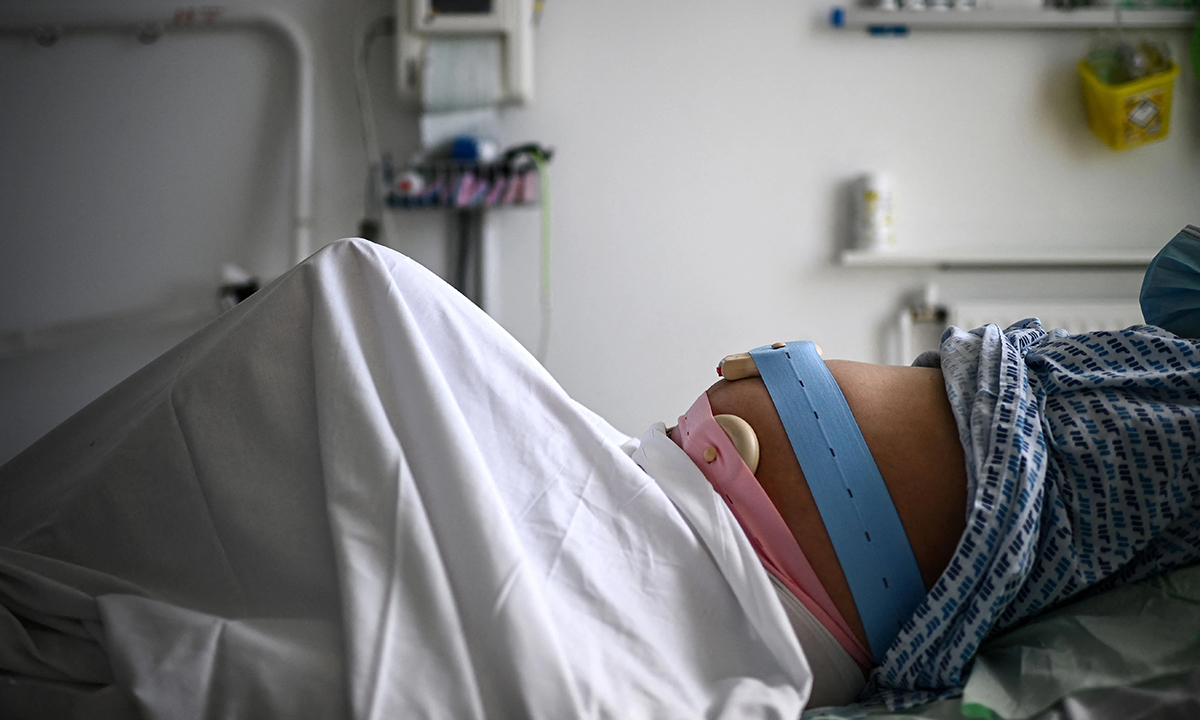
周三發(fā)布的一份政府報告顯示,新冠肺炎導(dǎo)致去年美國死于妊娠或分娩并發(fā)癥的女性人數(shù)急劇增加,,非裔和拉美裔女性不成比例地遭受更大沖擊,。
該報告列出了全美各地準媽媽和新生兒面臨的嚴峻形勢。
報告發(fā)現(xiàn),,自2018年以來,,美國與懷孕相關(guān)的死亡人數(shù)激增近80%,在2021年報告的1178例死亡病例中,,新冠肺炎疫情的沖擊因素占1/4。早產(chǎn)兒和低出生體重兒的比例在去年也有所上升,,此前多年來一直保持穩(wěn)定,。越來越多的孕婦或產(chǎn)后婦女報告有抑郁癥狀。
伊利諾伊大學(xué)香檳分校(University of Illinois at Urbana-Champaign)的孕產(chǎn)婦健康研究員凱倫·塔布·迪娜(Karen Tabb Dina)說:“我國已處于孕產(chǎn)婦死亡率危機之中,。這確實表明,,新冠肺炎疫情加劇了這一危機,達到了我國無法應(yīng)對的程度,?!?/p>
撰寫這份報告的無黨派機構(gòu)美國政府問責(zé)局(U.S. Government Accountability Office)在國會授權(quán)其在2020年冠狀病毒救濟法案中審查孕產(chǎn)婦健康結(jié)果后,分析了與懷孕相關(guān)的死亡,。
美國的孕產(chǎn)婦死亡率高于許多其他發(fā)達國家,,在疫情之前幾年就一直在上升,而新冠肺炎疫情又導(dǎo)致孕婦的狀況惡化,。
在懷孕期間感染病毒的女性面臨更高的健康風(fēng)險,。醫(yī)療人員短缺和各項疫情限制措施使得準媽媽在獲取醫(yī)療保健時面臨諸多障礙,疫情帶來的壓力還加劇了孕婦抑郁癥狀,,這是懷孕期間的一種常見癥狀,。
塔布·迪娜說,,心理健康問題可能是導(dǎo)致與懷孕相關(guān)死亡人數(shù)增加的原因之一。許多在懷孕期間或之后出現(xiàn)抑郁和焦慮癥狀的女性很難得到她們需要的護理,。
“心理健康問題是我們不甚了解的懷孕期間最大的并發(fā)癥,。”她說,。
美國政府問責(zé)局主任卡羅琳·約科姆(Carolyn Yocom)指出,,美國孕產(chǎn)婦死亡人數(shù)出現(xiàn)最大激增的時間區(qū)間是2021年7月至12月,當時新冠病毒德爾塔變異毒株感染了數(shù)百萬人,。
約科姆說:“從數(shù)據(jù)中可以很清楚地看到,,該病毒的傳播時間與孕產(chǎn)婦死亡人數(shù)激增的時間相對應(yīng)?!?/p>
非裔孕產(chǎn)婦的死亡率上升尤其明顯,,她們長期以來都面臨著比同齡人更糟糕的結(jié)局。
每10萬非裔女性中與妊娠或分娩并發(fā)癥相關(guān)的死亡人數(shù)從2019年的44人攀升至2021年的69人,,白人女性2021年與妊娠或分娩并發(fā)癥相關(guān)的死亡人數(shù)為26人,,比2019年的17.9有所上升。
拉美裔孕產(chǎn)婦死亡率一直在下降,,但在疫情期間再次上升,,每10萬拉美裔女性中與妊娠或分娩并發(fā)癥相關(guān)的死亡人數(shù)從2019年的12.6人攀升至2021年的27.5人。
非裔和拉美裔女性死于新冠肺炎的比例也更高,,部分原因是她們獲得醫(yī)療保健的機會較少,,而且往往從事接觸病毒的基本工作。
根據(jù)美國政府問責(zé)局的另一份報告,,早在新冠開始傳播之前,,非裔、低收入和農(nóng)村女性能夠獲得的妊娠護理就低于標準,,這使她們面臨更大的妊娠風(fēng)險,。
該報告稱,在農(nóng)村地區(qū),、低收入社區(qū)和以非裔為主的社區(qū),,醫(yī)院一直在減少產(chǎn)科服務(wù)。
審查發(fā)現(xiàn),,截至2018年,,超過一半的鄉(xiāng)村地區(qū)縣級區(qū)域沒有一家醫(yī)院提供妊娠護理。
報告發(fā)現(xiàn):“在農(nóng)村地區(qū),,醫(yī)院產(chǎn)科服務(wù)的缺失與院外分娩和早產(chǎn)的增加有關(guān),,這可能會導(dǎo)致產(chǎn)婦和嬰兒狀況堪憂?!保ㄘ敻恢形木W(wǎng))
譯者:中慧言-王芳
周三發(fā)布的一份政府報告顯示,,新冠肺炎導(dǎo)致去年美國死于妊娠或分娩并發(fā)癥的女性人數(shù)急劇增加,,非裔和拉美裔女性不成比例地遭受更大沖擊。
該報告列出了全美各地準媽媽和新生兒面臨的嚴峻形勢,。
報告發(fā)現(xiàn),,自2018年以來,美國與懷孕相關(guān)的死亡人數(shù)激增近80%,,在2021年報告的1178例死亡病例中,,新冠肺炎疫情的沖擊因素占1/4。早產(chǎn)兒和低出生體重兒的比例在去年也有所上升,,此前多年來一直保持穩(wěn)定,。越來越多的孕婦或產(chǎn)后婦女報告有抑郁癥狀。
伊利諾伊大學(xué)香檳分校(University of Illinois at Urbana-Champaign)的孕產(chǎn)婦健康研究員凱倫·塔布·迪娜(Karen Tabb Dina)說:“我國已處于孕產(chǎn)婦死亡率危機之中,。這確實表明,,新冠肺炎疫情加劇了這一危機,達到了我國無法應(yīng)對的程度,?!?/p>
撰寫這份報告的無黨派機構(gòu)美國政府問責(zé)局(U.S. Government Accountability Office)在國會授權(quán)其在2020年冠狀病毒救濟法案中審查孕產(chǎn)婦健康結(jié)果后,分析了與懷孕相關(guān)的死亡,。
美國的孕產(chǎn)婦死亡率高于許多其他發(fā)達國家,,在疫情之前幾年就一直在上升,而新冠肺炎疫情又導(dǎo)致孕婦的狀況惡化,。
在懷孕期間感染病毒的女性面臨更高的健康風(fēng)險,。醫(yī)療人員短缺和各項疫情限制措施使得準媽媽在獲取醫(yī)療保健時面臨諸多障礙,疫情帶來的壓力還加劇了孕婦抑郁癥狀,,這是懷孕期間的一種常見癥狀,。
塔布·迪娜說,心理健康問題可能是導(dǎo)致與懷孕相關(guān)死亡人數(shù)增加的原因之一,。許多在懷孕期間或之后出現(xiàn)抑郁和焦慮癥狀的女性很難得到她們需要的護理。
“心理健康問題是我們不甚了解的懷孕期間最大的并發(fā)癥,?!彼f。
美國政府問責(zé)局主任卡羅琳·約科姆(Carolyn Yocom)指出,,美國孕產(chǎn)婦死亡人數(shù)出現(xiàn)最大激增的時間區(qū)間是2021年7月至12月,,當時新冠病毒德爾塔變異毒株感染了數(shù)百萬人。
約科姆說:“從數(shù)據(jù)中可以很清楚地看到,,該病毒的傳播時間與孕產(chǎn)婦死亡人數(shù)激增的時間相對應(yīng),。”
非裔孕產(chǎn)婦的死亡率上升尤其明顯,,她們長期以來都面臨著比同齡人更糟糕的結(jié)局,。
每10萬非裔女性中與妊娠或分娩并發(fā)癥相關(guān)的死亡人數(shù)從2019年的44人攀升至2021年的69人,,白人女性2021年與妊娠或分娩并發(fā)癥相關(guān)的死亡人數(shù)為26人,比2019年的17.9有所上升,。
拉美裔孕產(chǎn)婦死亡率一直在下降,,但在疫情期間再次上升,每10萬拉美裔女性中與妊娠或分娩并發(fā)癥相關(guān)的死亡人數(shù)從2019年的12.6人攀升至2021年的27.5人,。
非裔和拉美裔女性死于新冠肺炎的比例也更高,,部分原因是她們獲得醫(yī)療保健的機會較少,而且往往從事接觸病毒的基本工作,。
根據(jù)美國政府問責(zé)局的另一份報告,,早在新冠開始傳播之前,非裔,、低收入和農(nóng)村女性能夠獲得的妊娠護理就低于標準,,這使她們面臨更大的妊娠風(fēng)險。
該報告稱,,在農(nóng)村地區(qū),、低收入社區(qū)和以非裔為主的社區(qū),醫(yī)院一直在減少產(chǎn)科服務(wù),。
審查發(fā)現(xiàn),,截至2018年,超過一半的鄉(xiāng)村地區(qū)縣級區(qū)域沒有一家醫(yī)院提供妊娠護理,。
報告發(fā)現(xiàn):“在農(nóng)村地區(qū),,醫(yī)院產(chǎn)科服務(wù)的缺失與院外分娩和早產(chǎn)的增加有關(guān),這可能會導(dǎo)致產(chǎn)婦和嬰兒狀況堪憂,?!保ㄘ敻恢形木W(wǎng))
譯者:中慧言-王芳
COVID-19 drove a dramatic increase in the number of women who died from pregnancy or childbirth complications in the U.S. last year, a crisis that has disproportionately claimed Black and Hispanic women as victims, according to a government report released Wednesday.
The report lays out grim trends across the country for expectant mothers and their newborn babies.
It finds that pregnancy-related deaths have spiked nearly 80% since 2018, with COVID-19 being a factor in a quarter of the 1,178 deaths reported last year. The percentage of preterm and low birthweight babies also went up last year, after holding steady for years. And more pregnant or postpartum women are reporting symptoms of depression.
“We were already in the middle of a crisis with maternal mortality in our country,” said Karen Tabb Dina, a maternal health researcher at the University of Illinois at Urbana-Champaign. “This really shows that COVID-19 has exacerbated that crisis to rates that we, as a country, are not able to handle.”
The nonpartisan U.S. Government Accountability Office, which authored the report, analyzed pregnancy-related deaths after Congress mandated that it review maternal health outcomes in the 2020 coronavirus relief bill.
The maternal death rate in the U.S. is higher than many other developed nations and had been on the rise in the years leading up to the pandemic, but COVID-19 has only worsened conditions here for pregnant women.
Women who contract the virus while pregnant face elevated health risks. Staffing shortages and COVID-19 restrictions created more hurdles for expecting mothers to get in-person health care; And pandemic stress has intensified depression, a common condition during pregnancy.
Mental health issues likely contributed to the increase in pregnancy-related deaths, Tabb Dina said. Many women who experience depression and anxiety during or after their pregnancy struggle to get the care they need.
“Mental health is the greatest complication in pregnancy that we don’t understand,” she said.
The biggest spike in deaths came during July through December of last year, as the COVID-19 delta variant infected millions, noted Carolyn Yocom, a director at the Government Accountability Office.
“It’s really clear from the data that the time in which the delta variant spread seemed to correspond to a huge increase in deaths,” Yocom said.
The maternal death rate is particularly stark for Black women, who have long faced worse maternal outcomes than their peers.
Pregnancy-related deaths for every 100,000 births climbed from 44 in 2019 to 68.9 among Black women last year. White women had death rates of 26.1 last year, a jump from 17.9 in 2019.
Death rates among Hispanics had been on the decline, but they swelled again during the pandemic from 12.6 per 100,000 in 2019 to 27.5 last year.
Black and Hispanic people have also died at higher rates from COVID-19, in part because they have less access to medical care and often work essential jobs that exposed them to the virus.
Long before COVID-19 began spreading, the stage was set for Black, low-income and rural women to receive subpar pregnancy care — putting them at further risk for their pregnancies to go wrong, according to a separate GAO report.
Hospitals have been shedding their obstetric services in rural areas, low-income and majority Black communities, that report said.
More than half of rural counties didn’t have a hospital offering pregnancy care as of 2018, the review found.
“The loss of hospital-based obstetric services in rural areas is associated with increases in out-of-hospital births and pre-term births, which may contribute to poor maternal and infant outcomes,” the report found.






